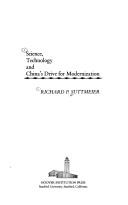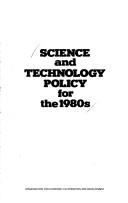| Listing 1 - 10 of 10 |
Sort by
|
Book
ISBN: 9264178708 9264178694 Year: 2012 Publisher: Paris : OECD,
Abstract | Keywords | Export | Availability | Bookmark
 Loading...
Loading...Choose an application
- Reference Manager
- EndNote
- RefWorks (Direct export to RefWorks)
In recent years, the need to address social and environmental challenges has grown in urgency. Climate change, global health, food security and many other global challenges cross national borders and affect a wide range of actors. Yet, in most cases, single governments cannot provide effective solutions. Global challenges call for co-operation on a global scale to build capacity in science, technology and innovation (STI) at both national and international levels. How can international co-operation in STI be scaled up and its scope broadened? How do different modes of governance of international co-operation in STI function and which modes lead to effective and efficient collaboration? Based on case studies, this book presents lessons and good practices on a range of governance mechanisms used for international co-operation in STI to address global challenges. The studies cover organisations that address global challenges including agriculture, food security, health, energy and climate change as well as organisations that bring together various types of actors. It takes a first step towards understanding the complexity of governance of international STI collaboration and provides the basis for future research.
Book
ISBN: 0521236592 Year: 1981 Publisher: Cambridge, Mass.
Abstract | Keywords | Export | Availability | Bookmark
 Loading...
Loading...Choose an application
- Reference Manager
- EndNote
- RefWorks (Direct export to RefWorks)
Science --- Science and society --- Sociology of science --- Normal science --- Philosophy of science --- International cooperation in science --- International cooperation --- Philosophy --- Social aspects --- Sociology of knowledge
Book
ISBN: 3851240960 Year: 1983 Publisher: Innsbruck : Institut für Vergleichende Sprachwissenschaft der Universität Innsbruck,
Abstract | Keywords | Export | Availability | Bookmark
 Loading...
Loading...Choose an application
- Reference Manager
- EndNote
- RefWorks (Direct export to RefWorks)
Science --- -Science --- -Natural science --- Science of science --- Sciences --- Societies, etc --- -History --- International cooperation --- -Societies, etc --- Natural science --- International cooperation in science --- History --- Natural sciences --- Autriche --- U.r.s.s. --- Echanges litteraires et scientifiques --- 1917-1945
Book
ISBN: 9811630259 9811630240 Year: 2021 Publisher: Gateway East, Singapore ; New Delhi, India : Springer : Climate Change Research Institute,
Abstract | Keywords | Export | Availability | Bookmark
 Loading...
Loading...Choose an application
- Reference Manager
- EndNote
- RefWorks (Direct export to RefWorks)
Science --- Diplomacy. --- Technology --- International cooperation. --- Sociological aspects. --- South Asia. --- Sociology of technology --- Sociology --- History --- International relations --- International cooperation in science --- Asia, South --- Asia, Southern --- Indian Sub-continent --- Indian Subcontinent --- Southern Asia --- Orient
Book
ISBN: 3631558791 9783631558799 Year: 2006 Volume: 67 67 Publisher: Frankfurt am Main: Lang,
Abstract | Keywords | Export | Availability | Bookmark
 Loading...
Loading...Choose an application
- Reference Manager
- EndNote
- RefWorks (Direct export to RefWorks)
German language --- Sociolinguistics --- Science --- Boycotts --- Political aspects --- International cooperation --- Language --- History --- Technical German --- Boycott --- Consumer boycotts --- Secondary boycotts --- Consumer behavior --- Passive resistance --- Natural science --- Science of science --- Sciences --- International cooperation in science --- Scientific German --- Technology --- Natural sciences --- Science - Political aspects - Europe --- Science - International cooperation --- Science - Language - History - 20th century --- German language - Political aspects --- German language - Technical German --- Boycotts - Europe - History - 20th century
Book
ISBN: 0521227445 Year: 1980 Publisher: Cambridge Cambridge University press
Abstract | Keywords | Export | Availability | Bookmark
 Loading...
Loading...Choose an application
- Reference Manager
- EndNote
- RefWorks (Direct export to RefWorks)
S19/0140 --- S21/0400 --- Science --- -Science --- -Science and state --- -#SML: Joseph Spae --- Science policy --- State and science --- State, The --- Natural science --- Science of science --- Sciences --- China: Natural sciences--History of sciences --- China: Medicine, public health and food--Western medicine --- International cooperation --- History --- Government policy --- Science and state --- International cooperation. --- History. --- #SML: Joseph Spae --- International cooperation in science
Book
ISBN: 1315471922 1315471914 1315471930 1138203335 Year: 2019 Publisher: Taylor & Francis
Abstract | Keywords | Export | Availability | Bookmark
 Loading...
Loading...Choose an application
- Reference Manager
- EndNote
- RefWorks (Direct export to RefWorks)
Science is increasingly defined by multidimensional collaborative networks. Despite the unprecedented growth of scientific collaboration around the globe—the collaborative turn—geography still matters for the cognitive enterprise. This book explores how geography conditions scientific collaboration and how collaboration affects the spatiality of science.This book offers a complex analysis of the spatial aspects of scientific collaboration, addressing the topic at a number of levels: individual, organizational, urban, regional, national, and international. Spatial patterns of scientific collaboration are analysed along with their determinants and consequences. By combining a vast array of approaches, concepts, and methodologies, the volume offers a comprehensive theoretical framework for the geography of scientific collaboration. The examples of scientific collaboration policy discussed in the book are taken from the European Union, the United States, and China. Through a number of case studies the authors analyse the background, development and evaluation of these policies. This book will be of interest to researchers in diverse disciplines such as regional studies, scientometrics, R&D policy, socio-economic geography and network analysis. It will also be of interest to policymakers, and to managers of research organisations.
Science --- Communication in science. --- International cooperation. --- Communication in research --- Science communication --- Science information --- Scientific communications --- International cooperation in science --- Adam Ploszaj --- Built Environment --- Dorota Celińska-Janowicz --- Innovation --- Knowledge --- Planning --- Regional Development --- Regional Science --- Regional Studies --- Resilience --- Richard Florida --- RSA --- RSA Conference --- Sally Hardy --- Smart Cities --- Spatial Econometrics --- Spatial Economics --- Technology --- Technopoles --- Territory --- Territory, Politics, Governance --- The City --- Urban Planning --- Urban Studies --- Urban Systems
Book

ISBN: 2271130328 2271089948 Year: 2019 Publisher: Paris : CNRS Éditions,
Abstract | Keywords | Export | Availability | Bookmark
 Loading...
Loading...Choose an application
- Reference Manager
- EndNote
- RefWorks (Direct export to RefWorks)
Au lendemain de la Seconde Guerre mondiale, le processus d'internationalisation de la science s'accélère et le projet - déjà ancien - d'établir « un espace européen de la recherche » se précise. La science fait débat et désigne désormais, dans une conception qui s'élargit, un ensemble de systèmes de savoirs, de pratiques et de dispositifs institutionnels. Le contexte de la guerre froide et les pratiques et échanges scientifiques interagissent. La guerre froide entraîne des reconfigurations, entre les États-Unis et l'Europe notamment, sans stopper les circulations entre les blocs rivaux. Trois questions principales traversent cet ouvrage qui s'inscrit dans le champ des « Cold War Studies » : quelle est la place du chercheur dans le réseau des institutions scientifiques, des structures politiques et des flux financiers ? Comment les réseaux scientifiques se mettent-ils en place à l'intersection de la science et de la politique ? Quelles sont les modalités des circulations, transferts et échanges entre les différentes cultures scientifiques ?
Science --- Knowledge, Sociology of --- Science and state --- Cold War --- Science and state. --- War --- International cooperation --- History --- Political aspects --- Social aspects. --- International cooperation. --- Influence. --- Cold War (1945-1989) --- World politics --- Science policy --- State and science --- State, The --- International cooperation in science --- Knowledge, Theory of (Sociology) --- Sociology of knowledge --- Communication --- Knowledge, Theory of --- Public opinion --- Sociology --- Social epistemology --- Natural science --- Natural sciences --- Science of science --- Sciences --- Government policy --- Seconde Guerre mondiale --- politique --- Cold War Studies --- espace européen --- réseau scientifique --- histoire des sciences --- culture scientifique --- Guerre froide

ISBN: 0817972323 9780817972325 Year: 1980 Volume: 223 Publisher: Stanford (Calif.): Hoover institution press,
Abstract | Keywords | Export | Availability | Bookmark
 Loading...
Loading...Choose an application
- Reference Manager
- EndNote
- RefWorks (Direct export to RefWorks)
Science and state --- Science --- Technology and state --- Technology --- Politique scientifique et technique --- Sciences --- Technologie --- International cooperation --- Coopération internationale --- S19/0130 --- S09/0250 --- S10/0760 --- 316.4 <51> --- -Science and state --- -Technology --- -Technology and state --- -State and technology --- Endowment of research --- Applied science --- Arts, Useful --- Science, Applied --- Useful arts --- Industrial arts --- Material culture --- Science policy --- State and science --- State, The --- Natural science --- Science of science --- China: Natural sciences--General works --- China: Foreign relations and world politics--General works: after 1840 --- China: Economics, industry and commerce--Transfer of technology --- Sociale processen--China --- Government policy --- International cooperation. --- -China: Natural sciences--General works --- 316.4 <51> Sociale processen--China --- Coopération internationale --- Technology and international relations --- Technology transfer --- International cooperation in science --- Science and state - China --- Science and state - United States --- Science - International cooperation --- Technology and state - China --- Technology and state - United States --- Technology - International cooperation

ISBN: 9264122540 Year: 1981 Publisher: Paris : [Washington, D.C. : Organisation for Economic Co-operation and Development, ; Sold by OECD Publications and Information Center],
Abstract | Keywords | Export | Availability | Bookmark
 Loading...
Loading...Choose an application
- Reference Manager
- EndNote
- RefWorks (Direct export to RefWorks)
Science and state. --- Technology and state. --- Science --- Technology --- Politique scientifique et technique --- Sciences --- Technologie --- International cooperation. --- Economic aspects. --- Coopération internationale --- Aspect économique --- 378 --- AA / International- internationaal --- 338.6 --- 62 --- -Science --- -Science and state --- -Technology --- -Technology and state --- State and technology --- Endowment of research --- Science and state --- Applied science --- Arts, Useful --- Science, Applied --- Useful arts --- Industrial arts --- Material culture --- Science policy --- State and science --- State, The --- Natural science --- Science of science --- Hoger onderwijs. Universitair onderwijs --(algemeen) --- Wetenschappelijk onderzoek en ontwikkeling. --- Ingenieurswetenschappen. Technologie in het algemeen --- Economic aspects --- International cooperation --- Government policy --- 378 Hoger onderwijs. Universitair onderwijs --(algemeen) --- Coopération internationale --- Aspect économique --- Technology and state --- Technology and international relations --- Technology transfer --- International cooperation in science --- Wetenschappelijk onderzoek en ontwikkeling --- Natural sciences
| Listing 1 - 10 of 10 |
Sort by
|

 Search
Search Feedback
Feedback About UniCat
About UniCat  Help
Help News
News